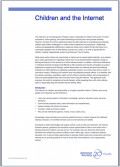The Internet is an increasing part of today’s culture, especially for children and youth, for whom schoolwork, online gaming, and social networking are among the most popular activities. However, the lack of common agreement about the right approach to educating and protecting children adds further challenges to a child’s online experience and expression. Additionally, cultural and geographical differences in legal and social norms reflect the fact that there is no universally accepted view of what defines a person as a child, or of what is appropriate for children, making “inappropriate content and behaviour” hard to define.
While some online crimes are cross-border in nature and so require global attention, at a national level, policy approaches to regulating content have so far predominantly employed a range of filtering techniques to limit access to or block Internet content. In addition, while local institutional or individual parental computer level filtering is often advised (and should, principally, be used in preference to network level filtering), neither these efforts nor national and local level filtering methods are 100% effective at regulating undesirable content, as at times they tend to under- or over-block content. Filtering at the network level has additional adverse effects. It is therefore vital for parents, educators, guardians, peers and the state to educate children and young people on risks and responsibilities they may encounter when using the Internet.
This approach could empower the youth to recognize and avoid dangers, while equipping them with online literacy skills to responsibly reap the benefits Internet activity offers.
